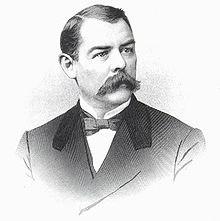Albion W. Tourgée

Albion Winegar Tourgée (born May 2, 1838, in Williamsfield, Ohio; died May 21, 1905 in Bordeaux, France) was an American Radical Republican, lawyer, judge, and novelist. A pioneer civil rights activist, he founded the National Citizens' Rights Association and litigated for the plaintiff Homer Plessy in the famous segregation case Plessy v. Ferguson (1896). Historian Mark Elliott credits Tourgee with introducing the metaphor of "color-blind" justice into legal discourse.[citation needed]
In the Civil War, Tourgée was wounded at Bull Run and Perryville and was held as a prisoner-of-war in Libby Prison for six months. After the war he established himself as a lawyer, farmer, and editor in Greensboro, North Carolina.
An active participant as a Reconstruction Carpetbagger in his new home, Tourgée had a number of inspiring and harrowing experiences that gave him ample material and impetus for the writing he would later undertake. In 1868 he represented Guilford County at the state constitutional convention, which was dominated by Republicans. There he successfully advocated for equal political and civil rights for all citizens; ending property qualifications for jury duty and officeholding; popular election of all state officers, including judges; free public education; abolition of whipping posts for those convicted of crimes; judicial reform; and uniform taxation. Nevertheless, he discovered that putting these reforms on paper did not translate into an ease of putting them into practice. As a Republican-installed superior court judge from 1868 to 1874, Tourgée confronted the increasingly violent Ku Klux Klan, which was very powerful in his district and repeatedly threatened his life. Among his other activities, he served as a delegate to the 1875 constitutional convention and ran a losing campaign for Congress in 1878. Success came the next year with A Fool's Errand, by One of the Fools, which sold 200,000 copies. Its sequel, Bricks Without Straw (1880), was also a best-seller.
In 1881 he moved to Philadelphia, making a living as a writer and editor of the literary weekly Our Continent until it failed in 1884. He wrote many more books and essays in the 1880s and 1890s. In 1897, President William McKinley appointed him U.S. consul to France, where he lived and served in Bordeaux until his death. In early 1905, Tourgée became gravely ill for several months, but then he appeared to rebound. His semi-recovery was only momentary, though, and he succumbed to the acute uremia resulting from one of his Civil War wounds.
Sources
- Mark Elliott, Color-Blind Justice: Albion Tourgée and the Quest for Racial Equality from the Civil War to Plessy v. Ferguson (2006). An award-winningbiography of Tourgée.
- Michael Kent Curtis, "Tourgée" in The American National Biography. (2000)
- Otto Olsen, Carpetbagger's Crusade: The Life of Albion Winegar Tourgée (1965)
- Roy F. Dibble, Albion W. Tourgée (1921)
- J. G. de Roulhac Hamilton, Reconstruction in North Carolina (1914)
- "Albion W. Tourgée Dead.", The New York Times, May 22, 1905, p. 7.
